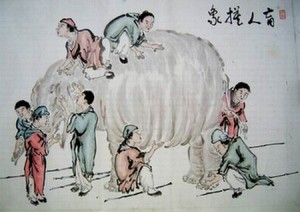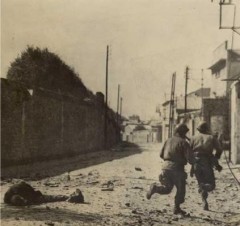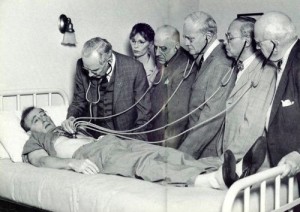The One-Eyed King 5/27/13
The One-Eyed King or, what teaching the visually impaired taught me about writing.
In the land of the blind, the one-eyed man is King. Well, that's what they say. Once in a parallel universe far, far, away and long, long, ago, the privilege of teaching work skills to blind young men and women fell to me. As with other teaching jobs I did, it was a place of small victories, poignancy, and fulfillment. I was the sighted one but I was not King. I was the teacher but they taught me.
Among all the life lessons they taught me, the lessons in language and writing tempered everything in my life from that time forward.
Blind is as blind does, I guess. All versions of the sight impaired entered my classroom at this city's 'Lighthouse for the Blind' from those with no vision (and sometimes no eyes) to those with some sight to those whose vision could not be corrected by modern science.
We, the sighted staff, once had a meeting with our one truly blind staff member on just what was 'blindness'. Most of us pictured blindness as something like being blindfolded. Our suave, gentle, sophisticated, painstakingly well-dressed, totally blind fellow staff member quickly set us straight.
'I don't see blackness,' he told us and shrugged. 'I don't see sight. I don't see anything. I don't see.'
He went on to explain that he no longer had anything like vision. Nothing there at all, he told us. Well, I know about nothingness. There is not even nothing in nothingness, I've pondered this before (see 'Infinity – Part 1 4/7/13' in my blog's April archive). Some of my students lived in that sightless place that was not even dark.
Others in the class saw enough of a difference of color to keep from walking into walls – if the walls were painted a light enough color. Some had a little space on the back wall of their eyes whose cones and rods functioned enough to make out the shape and color of things. A few wore coke-bottle lenses and saw the world in a blurred hazy fog.
My students were much like all of those 'disadvantaged' or 'disabled' I taught throughout my career. They share one thing. They each have a single-minded, determined, drive to be like (to live their lives like) everyone else. They want to enjoy life. They want to love and be loved. They want to accomplish. They want to work. It was my job to give them the tools to do just that. How?
Picture, if you will, sitting at a work table with four things resting upon it; a three-ring binder with pockets on the inside wall, and three stacks of tabbed section dividers – one stack with top tabs, one with middle tabs, and the last with bottom tabs. I'm glad you can picture that. My students could not. The job is to open the binder, with the pockets correctly placed to be along the lower edge, open the rings, and, insert one each of the dividers onto the rings, and then close it. Your second step will be to stack the loaded binder in an empty box at your feet to the left, pull another binder from a box at your feet to the right and repeat the process. Simple enough, right?
To the blind person, what's right and left, what's front and back, what's upper and lower, what's plastic and cardboard? Touch the objects on your table, one big weird-shaped single thing and three stacks of other big things. What's a stack? Open the big weird-shaped thing. It opens? How? Find the pockets on the inside surface and make sure they open away from you. What? Find the rings. What are rings? Put a finger from each hand into the same ring and pull it apart until it snaps open. Oh, that won't do. Pull on them until they snap apart. No. That's to too hard. Snap apart not break apart. Here, feel this.
Feel this – that's the secret. You have to make them feel it because they sure don't see it. Teaching the blind is definitely a 'hands-on' activity – for the teacher. There will be no showing, no demonstration, and no poster. Every lesson created without reference to image or demonstration. Try that as a 'writing prompt'. Try to explain how to do something without a mention of anything the 'doer' can see. Measure out a half cup of milk. Thread a bolt through two joined metal braces, slip a nut on a bolt, and tighten down the nut until firm. Place a knife, fork, and spoon in the center of a cloth napkin, roll up the napkin folding in the edges, and slip on a napkin ring. Button your shirt placing the buttons in the correct buttonhole. Tell me don't show me. Make me feel it.
The biggest irony of this whole experience was the moment my students finally got it right. They would say; oh, I see now.
Rites 5/15/13
See all the puffed up, radiantly proud parents wandering awed by the hoary stone edifice, by the well-tended lawns, by the sun-bathed fountains. See all the glowing, triumphant, robed youth flushed with the last vestige of their childhood's innocence and hope. See all the iridescent pink-faced scholars bedecked in all the trappings of their scholarship and shining with all the years beneath fluorescent bulbs. It is graduation day for my son and his peers. College is over. The fatted calf awaits all the prodigal young astride the threshold of adulthood.
See the conflict of many emotions written on their faces, on my son's face. Pride is there for the job well done. Anxiety, not totally hidden, shows clearly for the future lies just ahead.
Embarrassment fights for a place for mothers keep fidgeting with hair, dads can't stop hugging, and friends can see it all. Worry fades in and out for those with no job arranged and for those with
new jobs waiting.
Graduation is a rite of passage. It is of the most important rites of passage.
Rites of passage are many and varied in all cultures. They intend to mark the individual's passage from one stage of life to the next as well as to serve as an initiation ceremony marking entrance
into that next life phase from birth, puberty, education, marriage, adulthood, and finally even death. These are generally emotionally charged - they are 'life crises'. Name yours; baptisms, bar
mitzvahs and confirmations, Quinceañera, school graduation ceremonies, weddings, retirement parties, and funerals.
My personal favorite as an adolescent were the number of 'coming out' or debutant balls held for the high school girls in the very southern and genteel state I grew up in. The girls' parents spent so
much money on renting halls, hiring bands, decorating and catering, and empire-style ball gowns. The boys' parents spent on tux and limo rentals. The girls hoped for treatment as very lady-like newly
grown women. The boys all schemed for ways to secure and smuggle liquor into the events. I lied about it being all that much of a favorite. I was so ignorant, so white, and such a bad dancer I now
cringe thinking about it.
There were the opposite, negative, types of passages – of initiations inflicted upon our youth. For, in a way, modern society has lost or abandoned the almost mythic and intuitive rites of passage.
Or, have bent them out of shape due to secondary agendas. I have to speak for men and boys because it is those experiences I suffered through. Way back when, in the efforts to educate on and
reinforce the status quo, these rights of initiation men supported young men in making the tough transitions that life requires. These have largely disappeared and many of us do not or cannot, easily
or gracefully, move from childhood to adulthood. Folks smarter than me postulate that this is due to modern society's acceptance of initiation by peers. We see it in the hazing of fraternities,
sports teams, military school dorms, even street gangs. We see this in self-initiation behaviors such as rebellion, drug experimentation, and alienation. Some of the negative effects, thinks Robert
Bly, of men not having appropriate rites of passage are often a fear of other men, or seeing other men as competitors instead of brothers. I still burn when I remember the struggle to survive middle
school bullying and the endless practical jokes of the construction crews I joined.
I know my son experienced these diverse rites of passage. The graduations and the bullying. I hope that he listened closely to his College President's speech that quoted, of all people, George
Carlin. Mr. Carlin's wisdom is often not recognized. Let me share some of that quote:
'The paradox of our time in history is that we have taller buildings but shorter tempers, wider Freeways, but narrower viewpoints. We spend more, but have less, we buy more, but enjoy less. We have bigger houses and smaller families; more conveniences, but less time. We have more degrees but less sense; more knowledge, but less judgment; more experts, yet more problems; more medicine, but less wellness...
We have multiplied our possessions, but reduced our values. We talk too much, love too seldom, and hate too often...
We've learned how to make a living, but not a life. We've added years to life not life to years...
We write more, but learn less. We plan more, but accomplish less. We've learned to rush, but not to wait. We build more computers to hold more information, to produce more copies than ever, but we
communicate less and less...
Remember, say a kind word to someone who looks up to you in awe, because that little person soon will grow up and leave your side...'
I don't have the better ways to help much in ceremonially making his shift from boy to man. I can educate him, hug him, hope for him. That's about all. I do want him to know that being a man does not mean losing a child's wonder of life.
Soldier On 5/4/13
My father is a stalwart and upright man. Responsible to his duties, loyal to his friends, gentle in his nature. He is a man of strong values and few vices. A hero that I always disappointed because I did not feel I could ever live up to his example nor did I try to. The last thing I would think would be in his nature was that of a killer. The war in Germany made him into that. However, that did not come home to me until recently.
My brother and I knew he served. We knew he went to war. He shared very little of it with us. We wanted him to but mostly he avoided our pressing. He told us only a few, only the 'kinda funny' stuff.
Dad disliked the British. We thought he hated the Germans but the British earned his ire as well. He served under Gen. Bradley who he admired for taking great care his men. Gen. Bradley's troops fought next to Montgomery as they advanced across the northern most parts of the front. The Brits, according to Dad, stopped the war once a day for the whole campaign. At 4 p.m., come rain or shine, come hell or high water, the Brits would grind to a halt, stoke up a fire, and make tea. Tea! Now, my Dad didn't begrudge them the tea or the break. The fire smoke, however, drew German artillery. Dad and his men spent those hours pressed to the mud in the bottom of their foxholes while hell rained from the skies. He would hold up his hands fingers spread, turn his head to the side, and make a funny face part disgusted part fearful just as he must have done those many years before. We would see it and hear it in our minds and we would laugh.
In mid-December, 1944, Dad chopped slit trenches in frozen forest mud just north of Aachen. With the usual fog of war, real soupy fog closed him in and the forest shrunk down to a few feet of shadowy, black, leafless threes. He crouched shivering in the trench and feared because somewhere across the valley to his front he listened to the ugly sound of German armor rumbling. Left to right and unseen, the menacing sound went on around the clock for three straight days. They reported it to command. Command told them to disregard the demonstration. It was 1944. Germany no longer owned that much hardware. It was a demonstration to scare them, command said. On the fourth day, the noises stopped. Silence reigned. My daddy shrugged in acceptance. On the fifth day, the Battle of the Bulge began. They listened to the artillery just at midnight about eight miles south. One of his platoon whispered in the darkness, 'happy birthday Ira'. He was twenty-one. He shrugged again. We marveled at how one so young spent that birthday.
Still, these and other stories told passive tales. They did not tell of my gentle upright father the killer. About a year before my mother died and my dad was 88 years old, she brought that home to us.
'Your dad kicked me last night. He woke me up kicking me. Kicking and kicking me,' she said.
She told us that she turned over to have something to say about that. Dad was sound asleep; however, he was running in his sleep. His feet thrashed back and forth. He spoke in his sleep muttering. Then he spoke quite clearly.
'Well, just shoot him,' he said. A moment later his feet stopped thrashing and Dad went still.
We asked Dad what was going on in his dream.
'He was remembering the war,' Mom speculated.
My brother and I speculated too. We figured he took his platoon to battle attacking some objective. One of his men, we speculated, either captured or wounded a German soldier. With no time or enough men to deal with this enemy soldier the attack must be pressed onward, my gentle Dad, the 21-year-old sergeant in a miserable war, must decide what must be done. Not enough time, not enough men, just shoot him.
My Dad, the war hero, the gentle upright man sixty-six years after the event, remained silent.
May 5/1/13
Short and sweet today. I'm sick.
May is not a lucky month. Don't I know it. It is considered unlucky by many cultures. One does not buy new clothes in May. One does not begin new jobs, new projects, or new relationships in May. It is not safe to go on the water the first Monday in May. Neither fire, nor water, nor milk, nor salt should be given away for love or money. Don't wash a blanket in May. Wash a blanket in May/ Wash a loved one away. I would not let my wife set a May wedding date for our marriage being familiar with that superstition. Marry in the month of May, and you'll surely rue the day. We married on April 30th. Better safe than sorry. We celebrated our 30th anniversary just yesterday.
I started this May with a most horrible flu. Aches and pain and shortness of breath; dripping and sneezing and hacking; moans and groans and sweats and chills. It's awful. I hate it. So much to do and here I sit getting further and further behind. Even my cats give me wide birth and me so cozy and feverish warm. My one accomplishment is to burn through three boxes of tissue. My wife suddenly found an out-of-town appointment and beat it to the airport. 'Don't blame her. We had to cancel our fancy restaurant reservation and made do with Chinese delivery.
I sit armed with Ginseng tea, hot toddies, aspirin, thermometer, and warm sox and endless soup but alone the TV my only friend.
Yea May. This one has lived up to its reputation.






